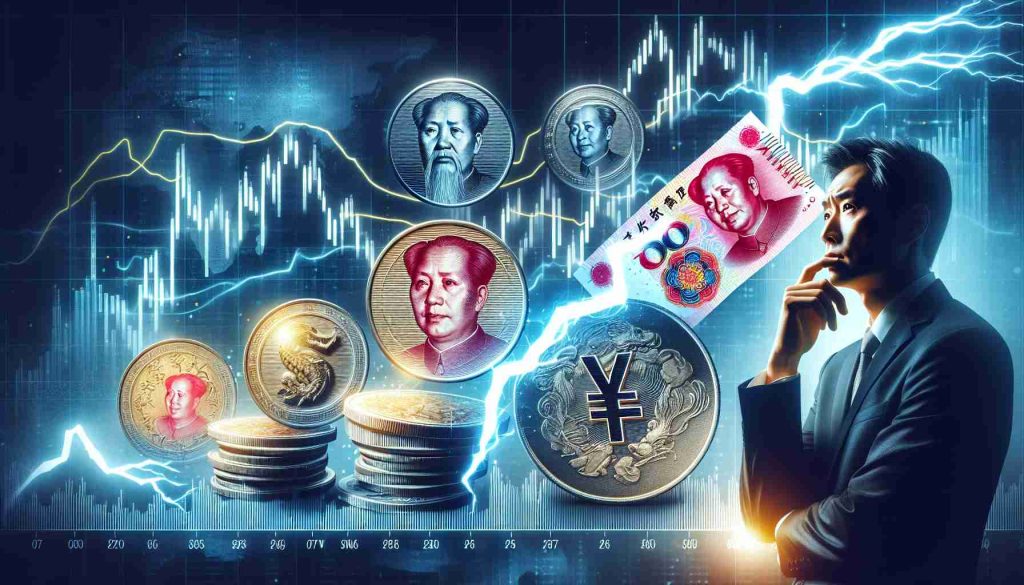As global markets brace themselves, all eyes are on China. With economic conditions growing fragile, analysts speculate whether the Communist Party might consider a tactic reminiscent of its 2015 yuan devaluation—the event that sent shockwaves through the economy.
In a calculated effort to maintain stability, officials, including President Xi Jinping and Premier Li Qiang, have taken measures to ensure the yuan remains above the psychologically significant level of 7.2 per dollar. This decision carries significant weight; a weaker yuan could hinder struggling property developers from paying off foreign debt, raising concerns over defaults. Additionally, weakening the currency now could jeopardize the ongoing effort to internationalize the yuan, a cornerstone of Xi’s financial reforms.
China faces persistent deflation signs, with consumer prices dropping for over a year, rekindling concerns of a prolonged economic slump. A drop to 7.5 or 7.6 per dollar may provoke aggressive responses, potentially igniting trade tensions as the newly elected Trump administration is set to tackle its own trade policies.
Should Beijing opt for a devaluation, it could spark fresh anxiety reminiscent of past global financial crises, particularly a decade ago. Given past predictions of hard landings for China, the implications of a weaker yuan could ripple far beyond its borders, challenging the delicate balance of global trade dynamics as the world prepares for another highly charged political era.
Is China on the Brink of Yuan Devaluation? Understanding the Implications
Current Economic Climate in China
China’s economy is facing increasing pressure from various factors, including deflation, struggling sectors, and international trade relations. Analysts are closely monitoring the situation, particularly as the Communist Party navigates its financial strategies. The possibility of a yuan devaluation, akin to the events of 2015, raises significant questions about global trade and economic stability.
Deflation and Economic Concerns
China has been grappling with persistent deflation, with consumer prices decreasing for several months. This trend is alarming for economic stability, as it may indicate a stagnation in consumer demand. Such conditions often lead to decreased business investment, laying the groundwork for a prolonged economic slump if not addressed effectively.
The Yuan’s Significant Threshold
Authorities, including President Xi Jinping and Premier Li Qiang, have made concerted efforts to keep the yuan above the critical level of 7.2 to 1 USD. A breach of this level could trigger heightened market volatility and fears of defaults among property developers, significantly impacting their ability to repay foreign debts. The ramifications of a weaker yuan could also complicate China’s efforts to internationalize its currency, a strategic initiative under Xi’s broader economic reforms.
Potential Global Repercussions
A hypothetical devaluation to around 7.5 or 7.6 per dollar could have a domino effect, exacerbating existing trade tensions, particularly as new U.S. trade policies take shape under a recently elected administration. This scenario evokes memories of past global financial downturns, where many economies were drawn into turmoil due to China’s policy changes.
Innovations and Strategic Measures
In light of these challenges, China is exploring innovative financial strategies to bolster its economy and stabilize the yuan. Initiatives aimed at strengthening internal consumption, promoting export diversification, and increasing foreign direct investment are on the table. These measures are crucial in mitigating the potential fallout from a weaker yuan.
Pros and Cons of Yuan Devaluation
Pros:
– Boost exports: A weaker yuan can make Chinese goods cheaper for foreign buyers, potentially stimulating demand for exports.
– Easing the burden on foreign debt: A devaluation could alleviate financial strain on companies with significant foreign obligations.
Cons:
– Increased capital outflows: Investors might withdraw their investments, fearing further devaluation.
– Trade tensions: A devaluation could lead to retaliatory measures from trading partners, heightening global economic strain.
Market Analysis and Predictions
As the global economy continues to evolve, China’s strategic choices regarding the yuan will play a crucial role in shaping international market trends. Economists suggest that careful monitoring is essential, as any signs of imminent devaluation could lead to significant shifts in global investment strategies and trade relationships.
Conclusion
China’s current economic situation requires delicate handling, particularly as it considers the potential for yuan devaluation. Such a move could have widespread implications not only for China but for the global economy as a whole. With ongoing trends and the political landscape evolving rapidly, the focus remains on how China will navigate these waters in the coming months.
For further insights on global economic trends, visit Bloomberg for updates and analysis.
